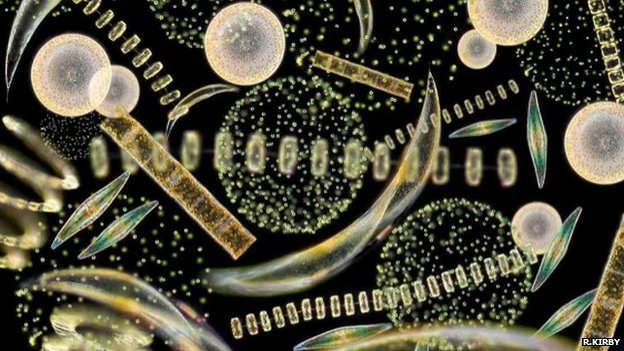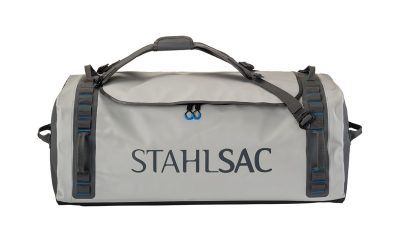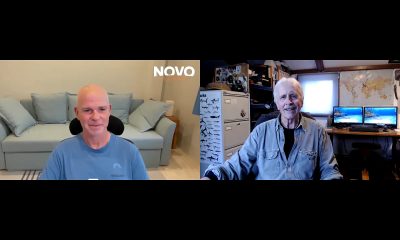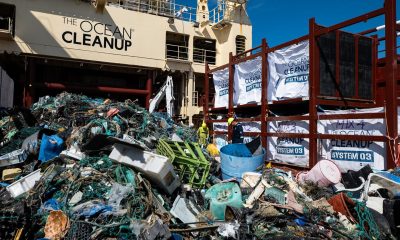Marine Life & Conservation
App Set To Match The Oceans’ Plankton

A study is calling on the world’s sailors to help map the oceans’ phytoplankton, microscopic plants that form the bedrock of marine food chains.
Researchers have developed an app for people to submit readings from Secchi disks – a method used since 1865.
The team hopes the data will help them understand what is happening beneath the waves.
They have been “astonished” by the response so far but are hoping for more readings from the southern hemisphere.
“The reason the project came about was because, in 2010, some Canadian scientists wrote a paper that suggested that the phytoplankton in the world’s oceans had declined by 40% since the 1950s,” explained project leader Richard Kirby, a research fellow at Plymouth University’s Marine Institute.
“If true, this is a dramatic decline. As phytoplankton starts the food chain, they dictate the productivity at every level above,” he observed.
“Ultimately, phytoplankton determines the amount of fish in the sea and the number of polar bears on the ice.”
Marine biologists have been using the Secchi disk method to measure the abundance of phytoplankton for 150 years.
The white disk measures 30cm (1ft) in diameter and is lowered into the water on the end of a tape measure. When it is no longer visible from the surface, the reading – known as the Secchi depth – is recorded.
“It is a very robust method and not prone to error and it is a good measure of phytoplankton abundance,” said Dr Kirby.
“Away from estuaries and more than a kilometre from the coast, the main influence on water clarity is phytoplankton.”
He explained how he had the idea of setting up a citizen science project: “It occurred to me sat at my desk that while there are a lot of scientists, there are not that many that are marine scientists, and fewer still that go to sea.
“And the ones that do go to sea do not go out very far. If they do go out far, they rarely go back to the same place.
“I thought that there are an awful lot of sailors out there; day sailors, cruising sailors. Many of these sailors will sail the same waters and take the same route time and time again.”
Dr Kirby, and colleagues Drs Nicholas Outram and Nigel Barlow from the University’s School of Computing and Mathematics, developed the Secchi Disk App that would store a reading while at sea before uploading it to a database once the smartphone was back within range of a mobile phone network.
“We can now collect Secchi depth measurements from all over the world’s oceans and add that to the data from the 1860s to make a continuous – with a slight dip – record to see what is happening to the phytoplankton in the oceans,” he said.
The database, managed by Dr Sam Lavender, is accessible, free-of-charge, from the project’s website.
The reason for collecting measurements via the Secchi method, Dr Kirby explained, was because the Canadian team’s findings proved to be quite controversial among scientists.
“Some said that they did not see any similar decline, while others said they saw an increase rather than a decline,” he said.
The study was criticised because it combined Secchi disk measurements with data gathered using modern technology that became available to scientists in the late 20th Century.
Despite the criticism, the authors have defended their findings, saying the dramatic decline was a result of sea surface temperature.
“They said that the warming had increased stratification so fewer nutrients were reaching the oceans’ surface, and so there was less phytoplankton growth,” Dr Kirby said.
He added that in the waters around UK shores, observations showed that phytoplankton were appearing at different times of the year.
He said that changes in the seas’ seasons had potential consequences for life beneath the waves.
“This is changing the coupling in the marine ecosystem. Evolutionarily, everything is synchronised – just as it is on land.
“When the timings start altering, even by just a fraction, then things no longer work through the food chain.”
To help raise awareness of the vital role phytoplankton plays in marine and terrestrial food chains, Dr Kirby has written and produced a short film called Ocean Drifters, which has been sent to every secondary school in England.
Narrated by Sir David Attenborough, the film also explains how plankton is responsible for the familiar smell of “sea air”, and how the tiny organisms are involved in the formation of clouds.
Source: www.bbc.co.uk/news
Photo: Richard Kirby
Blogs
The Ocean Cleanup Breaks 10,000,000 KG Barrier

The Ocean Cleanup, the global non-profit project, has removed a verified all-time total of ten million kilograms (22 million lbs.) of trash from oceans and rivers around the world – approximately the same weight as the Eiffel Tower.
To complete its mission of ridding the oceans of plastic, The Ocean Cleanup uses a dual strategy: cleaning up the Great Pacific Garbage Patch (GPGP) to remove the plastic already afloat in the oceans, while stopping the flow of plastic from the world’s most polluting rivers.
Through cleaning operations in the GPGP and in rivers in eight countries, the cumulative total of trash removed has now surpassed ten million kilograms. This milestone demonstrates the acceleration of The Ocean Cleanup’s impact, while underlining the astonishing scale of the plastic pollution problem and the need for continued support and action.
While encouraging for the mission, this milestone is only a staging point: millions more tons of plastic still pollute our oceans and The Ocean Cleanup intends to continue learning, improving and innovating to solve this global catastrophe.
This announcement comes as governments from around the world meet to continue negotiations to develop a new legally binding instrument to end plastic pollution at INC4 in Ottawa, Canada. Representatives of The Ocean Cleanup will be in attendance and the organization will be urging decision-makers to collaborate towards a comprehensive and ambitious global treaty which addresses plastic at all stages of its life cycle and in all marine environments worldwide, including in areas beyond national jurisdiction.
It is encouraging to see that the need for remediation is reflected in the various options for potential treaty provisions. It is essential that the final treaty contains clear targets for the remediation of legacy plastic pollution, and reduction of riverine plastic emissions.
Tackling plastic pollution requires innovative and impactful solutions. The treaty should therefore incentivize the innovation ecosystem by fostering innovations that make maximal use of data, technology and scientific knowledge – such as those designed and deployed by The Ocean Cleanup.
‘After many tough years of trial and error, it’s amazing to see our work is starting to pay off – and I am proud of the team who has brought us to this point.’ said Boyan Slat, Founder and CEO of The Ocean Cleanup. ‘While we still have a long way to go, our recent successes fill us with renewed confidence that the oceans can be cleaned.’
The Ocean Cleanup was founded in 2013 and captured its first plastic in 2019, with the first confirmed catch in the GPGP coming soon after the deployment of Interceptor 001 in Jakarta, Indonesia. After surpassing one million kilograms of trash removed in early 2022, the non-profit project has since progressed to the third iteration of its GPGP cleaning solution, known as System 03, and a network of Interceptors currently covering rivers in eight countries, with more deployments set for 2024.
About The Ocean Cleanup
The Ocean Cleanup is an international non-profit organization that develops and scales technologies to rid the world’s oceans of plastic. They aim to achieve this goal through a dual strategy: stemming the inflow via rivers and cleaning up the legacy plastic that has already accumulated in the ocean. For the latter, The Ocean Cleanup develops large-scale systems to efficiently concentrate the plastic for periodic removal. This plastic is tracked and traced through DNV’s chain of custody model to certify claims of origin when recycling it into new products. To curb the tide via rivers, The Ocean Cleanup has developed Interceptor™ solutions to halt and extract riverine plastic before it reaches the ocean. Founded in 2013 by Boyan Slat, The Ocean Cleanup now employs a broadly multi-disciplined team of approximately 140. The foundation is headquartered in Rotterdam, the Netherlands.
For more information, visit: theoceancleanup.com and follow @theoceancleanup on social media.
Marine Life & Conservation
Steve Backshall to headline Shark Trust’s flagship event: For the Love of Sharks

Join a host of amazing, shark loving, speakers including Steve Backshall and the Shark Trust team for an evening celebrating shark conservation at the Royal Geographical Society in London this November.
Date: 29th November 2024
Time: 6-10pm
Location: Royal Geographical Society, London
Tickets: https://www.sharktrust.org/Event/flos24
The event will be a celebration of all things shark. Those lucky enough to get hold of tickets will hear from engaging guest speakers with a passion for sharks.
The line-up includes (*subject to change if unforeseen circumstances arise)
Steve Backshall: One of television’s busiest presenters, BAFTA award-winning wildlife expert Steve has been passionate about the wild world ever since he was young.
Steve’s impressive TV career has taken him all around the world, investigating a wide array of species and environments. Steve has filmed over 100 hours of children’s wildlife programmes with the BAFTA award winning Deadly 60 franchise and recently, with Sky Nature, for his new series ‘Whale with Steve Backshall’. He has been a patron for the Shark Trust for 10 years.
Simon Rogerson: is a photojournalist specialising in natural history, diving and the sea.
He is editor of SCUBA magazine, the official journal of the British Sub-Aqua Club. Simon started his career as a crime reporter but gravitated towards his ‘less depressing’ interest in underwater exploration, joining the staff of DIVE magazine in 1999. In 2005 he was named ‘Editor of the Year’ in the PPA’s Independent Publishing Awards. Simon also works as a freelance writer, contributing frequently to the Sunday Times and Telegraph, in addition to BBC Wildlife, Esquire, and a host of international diving magazines. He is the author of a book, Dive Red Sea, published by Ultimate Sports. Now based in Berkshire, Simon has been a Patron of the Shark Trust for 20 years.
More speakers to be announced soon. Head to the Shark Trust website to learn more.
The evening will also allow guests the final chance to see the Oceanic 31, shark art exhibition. Some of the artwork will be auctioned/raffled at the event, while the rest will be auctioned online to raise money for the Shark Trust Oceanic Programme.
For the Love of Sharks is an evening with something for everyone who is interested and fascinated by sharks. Join the Shark Trust, their Patrons, Trustees and Staff, along with a host of supporters for this celebration of shark conservation.
For more information or to buy a ticket: https://www.sharktrust.org/Event/flos24
-

 News3 months ago
News3 months agoCapturing Critters in Lembeh Underwater Photography Workshop 2024: Event Roundup
-

 Marine Life & Conservation Blogs3 months ago
Marine Life & Conservation Blogs3 months agoCreature Feature: Swell Sharks
-

 Blogs2 months ago
Blogs2 months agoMurex Resorts: Passport to Paradise!
-

 Blogs2 months ago
Blogs2 months agoDiver Discovering Whale Skeletons Beneath Ice Judged World’s Best Underwater Photograph
-

 Gear Reviews3 weeks ago
Gear Reviews3 weeks agoGEAR REVIEW – Revolutionising Diving Comfort: The Sharkskin T2 Chillproof Suit
-

 Gear Reviews3 months ago
Gear Reviews3 months agoGear Review: Oceanic+ Dive Housing for iPhone
-

 News2 months ago
News2 months agoPADI Teams Up with Wellness Brand Neuro to Drive Ocean Change and Create a Blue State of Mind
-

 Marine Life & Conservation2 months ago
Marine Life & Conservation2 months agoSave the Manatee Club launches brand new webcams at Silver Springs State Park, Florida

















